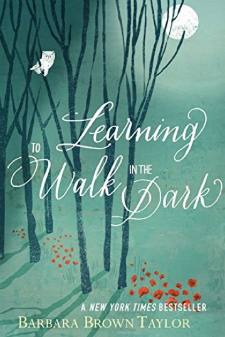Learning to walk in the dark
Barbara Brown Taylor attempts to provide a way to find spirituality in those times when we don’t have all the answers
 Learning to Walk in the Dark
Learning to Walk in the Dark
By Barbara Brown Taylor
Canterbury
ISBN 978-1-84825-615-6
Reviewer John Rackley
As someone who prefers a dull day to bright sunlight; looks forward to the night's drawing in, is not afraid of the dark and enjoys night trekking, Barbara Brown Taylor would say I have a leaning towards Lunar Spirituality. This is in contrast to the Full Solar Spirituality which she identifies as the most commended bench mark for healthy Christian living.
She is writing for people like herself whose spiritual nature goes through phases like those of the moon and cannot bear the full force of shadow-less religious certainties and jolliness. She describes this book as the third of a trilogy of her books; after Leaving Church and Altars of the World.
There is much autobiography here. She tells a good tale, excels in punchy, incisive pay-off lines and offers various ways in which we can explore the spirituality of darkness.
She suggests that it is important to discover your own history of darkness and answers questions like
How many types of twilight are there?
What does the bible say about bedtimes?
Do you the meaning of nyctophobia?
There is clear but brief analysis of the biblical use of the images of dark and light with the scriptures favouring the latter; but as is often the case with the bible there is a minority report; in this case on the positive nature of darkness as in the experience of Moses.
Her chapter on the writings of St John of the Cross offers a brilliant introduction to his insights and the continuing relevance of Fowlers stages of faith to Christian experience today.
In many ways much of the book could be seen to be an extended meditation on the question of Ps 8: when I look at the stars; who are we? Our own darker emotions and attitudes have a relationship with the inconsequential piece of dust that we feel we are in contrast with the universe. To discover how to cope with them we need to learn to embrace the gifts of darkness – seclusion, sensitivity, stillness and the God who dwells in deep or dazzling darkness.
Yet is that the defining testimony to the nature of God that we find in the Bible? This is one of a number of issues that the writing of Taylor invites us to consider.
Firstly, she clearly takes Scripture seriously and knows her way around biblical scholarship. In this book she gives priority to what I have called the bible’s minority report on darkness. She prioritises the experience of Moses on the mountain over that of the New Testament’s and John’s gospel in particular.
The Bible brings together the god who dwells in deep darkness with the god in whom there is no darkness at all. Are they the same? Are we to let them blend? How do we use scripture if we are called to believe that the Christ event is the test of it all? Having said that Jesus prayed at night and one of the few times we witness at prayer with the Father is night in Gethsemane.
Next, she lets the narrative of her own life shape her interpretation and explanation of theological reflection. It reminds of the Biography as Theology movement of the early 1970s. Its early proponent James McClendon subtitled his book of that name with; how life stories can remake today’s theology. I wonder whether that movement should not make a come-back. It would appear to be the justification for much that is being written about spirituality today.
And finally she is yet another author and speaker from the USA who is being given space and time in our churches, conferences and book shelves. From Yaconelli to McClaren or Yancey to our own Tom Wright who seems increasingly to be writing for that polarised and harsh religious climate they are over here. Can they really speak into our context?
She writes with humanity. This makes her material transcend its provenance. Who has not had those moments when favoured hymns and scriptures have lost their ability to carry our faith? Why are there so many people for whom the certainties of belief have become dull and unrelated to experience? Have we not met people who say they have lost their faith but what they actually mean is that they have, in her words, lost faith in the system that promised to help them grasp God?
It is that deep need that she is addressing in this book. Her answers may not comfort everyone. They may disconcert those who want a Full Solar spirituality; but for those of us who know we must dwell the twilight and wait on the descent of the night she may well turn our feelings of loss into a walk toward hope.
She writes:
The good news is that dark and light, faith and doubt, divine absence and presence, do not exist as polar opposites. Instead they exist with and within each other, like distinct waves that roll out of the same ocean and roll back into it again.
And then comments:
This faith will not give me a safe place to settle but practicing it will require me to celebrate the sacraments of defeat and loss, and since the religion I know best has a lot to say about losing as the precondition for finding, I can live with that.
John Rackley is a Baptist minister who blogs on windingquest.wordpress.com and has written more about Barbara Brown Taylor there
Baptist Times, 18/09/2015